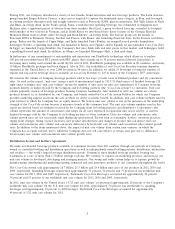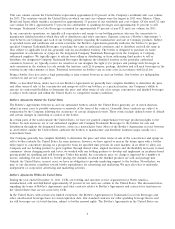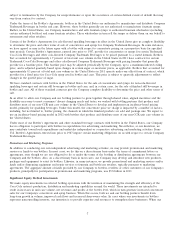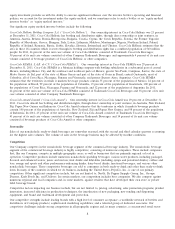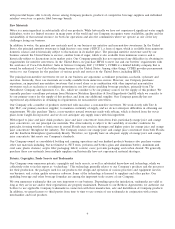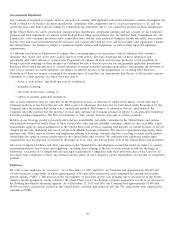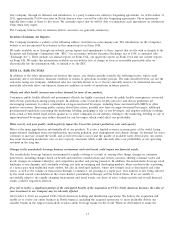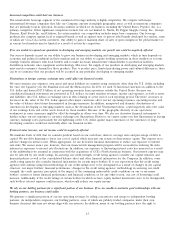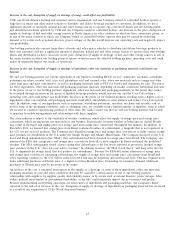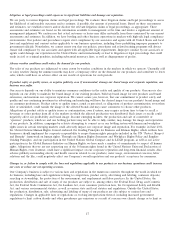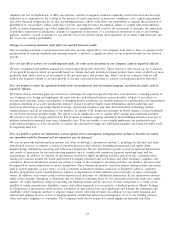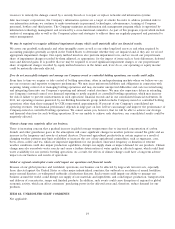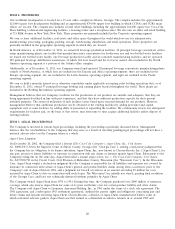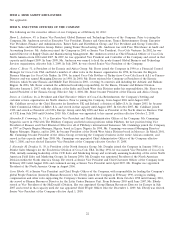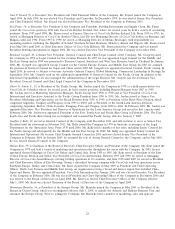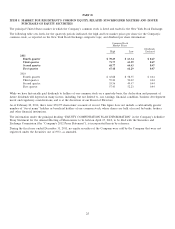Coca Cola 2011 Annual Report Download - page 17
Download and view the complete annual report
Please find page 17 of the 2011 Coca Cola annual report below. You can navigate through the pages in the report by either clicking on the pages listed below, or by using the keyword search tool below to find specific information within the annual report.Increase in the cost, disruption of supply or shortage of energy could affect our profitability.
CCR, our North America bottling and customer service organization, and our Company-owned or controlled bottlers operate a
large fleet of trucks and other motor vehicles to distribute and deliver beverage products to customers. In addition, we use a
significant amount of electricity, natural gas and other energy sources to operate our concentrate plants and the bottling plants
and distribution facilities operated by CCR and our Company-owned or controlled bottlers. An increase in the price, disruption of
supply or shortage of fuel and other energy sources in North America, in other countries in which we have concentrate plants, or
in any of the major markets in which our Company-owned or controlled bottlers operate that may be caused by increasing
demand or by events such as natural disasters, power outages or the like would increase our operating costs and negatively impact
our profitability.
Our bottling partners also operate large fleets of trucks and other motor vehicles to distribute and deliver beverage products to
their own customers and use a significant amount of electricity, natural gas and other energy sources to operate their own bottling
plants and distribution facilities. Increases in the price, disruption of supply or shortage of fuel and other energy sources in any of
the major markets in which our bottling partners operate would increase the affected bottling partners’ operating costs and could
indirectly negatively impact our results of operations.
Increase in the cost, disruption of supply or shortage of ingredients, other raw materials or packaging materials could harm our
business.
We and our bottling partners use various ingredients in our business, including HFCS, sucrose, aspartame, saccharin, acesulfame
potassium, sucralose, ascorbic acid, citric acid, phosphoric acid and caramel color, other raw materials such as orange and other
citrus fruit juice and juice concentrates, as well as packaging materials such as PET for bottles and aluminum for cans. The prices
for these ingredients, other raw materials and packaging materials fluctuate depending on market conditions. Substantial increases
in the prices of our or our bottling partners’ ingredients, other raw materials and packaging materials, to the extent they cannot
be recouped through increases in the prices of finished beverage products, would increase our and the Coca-Cola system’s
operating costs and could reduce our profitability. Increases in the prices of our finished products resulting from a higher cost of
ingredients, other raw materials and packaging materials could affect affordability in some markets and reduce Coca-Cola system
sales. In addition, some of our ingredients, such as aspartame, acesulfame potassium, sucralose, saccharin and ascorbic acid, as
well as some of the packaging containers, such as aluminum cans, are available from a limited number of suppliers, some of which
are located in countries experiencing political or other risks. We cannot assure you that we and our bottling partners will be able
to maintain favorable arrangements and relationships with these suppliers.
The citrus industry is subject to the variability of weather conditions, which affect the supply of orange juice and orange juice
concentrate, which are important raw materials for our business. In particular, freezing weather or hurricanes in central Florida
may result in shortages and higher prices for orange juice and orange juice concentrate throughout the industry. In addition, in
December 2011, we learned that orange juice from Brazil contained residues of carbendazim, a fungicide that is not registered in
the U.S. for use on food products. The Company uses Brazilian orange juice and orange juice concentrate to make various orange
juice products for distribution in the U.S. under the Simply Orange and Minute Maid brands. The Company disclosed to the U.S.
Food and Drug Administration (the ‘‘FDA’’) that carbendazim had been detected in orange juice from Brazil. The Company also
informed the FDA that orange juice and orange juice concentrate from all or most suppliers in Brazil contained the prohibited
residues. The FDA subsequently issued a letter stating that carbendazim at the low levels reported as present in finished orange
juice products in the U.S. ‘‘does not raise safety concerns.’’ In addition, however, the FDA stated that it ‘‘will deny entry into the
U.S. to shipments [of orange juice] that test positive for carbendazim.’’ Because the FDA will refuse admission of orange juice
and orange juice concentrate containing carbendazim, the supply of orange juice and orange juice concentrate from Brazil and
other exporting countries to the U.S. will be reduced in 2012 and may be negatively affected beyond 2012. This has required us to
make additional purchases of Florida juice at a higher cost than Brazilian juice. Depending on consumer demand, additional
purchases of Florida juice may be necessary in the future.
An increase in the cost, a sustained interruption in the supply, or a shortage of some of these ingredients, other raw materials,
packaging materials or cans and other containers that may be caused by a deterioration of our or our bottling partners’
relationships with suppliers; by supplier quality and reliability issues; or by events such as natural disasters, power outages, labor
strikes, political uncertainties or governmental instability, or the like, could negatively impact our net revenues and profits.
Because manufacturing and bottling operations are heavy users of ingredients and packaging materials, our Company’s direct
exposure to the risk of an increase in the cost, disruption of supply or shortage of ingredients or packaging materials has increased
as a result of our acquisition of CCE’s North American business.
15


